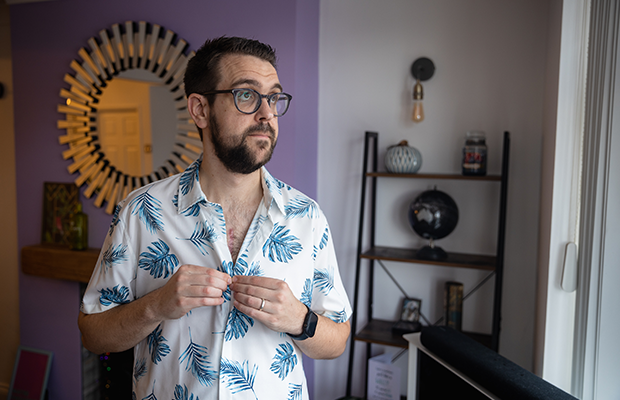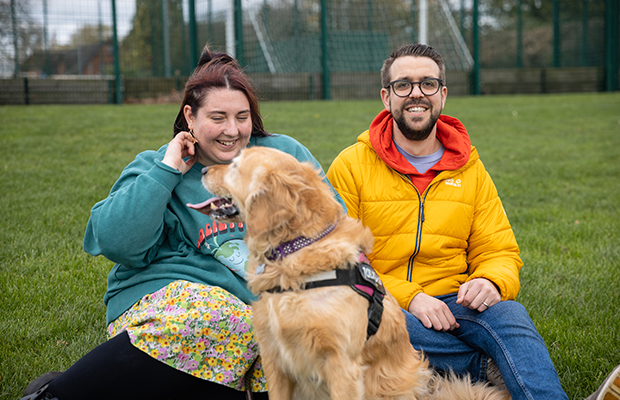An unexpected diagnosis
Stuart Harrod, 31, from Nottingham, developed endocarditis, an infection of the inner lining of the heart. The infection damaged his mitral valve, and he needed surgery to replace it.
“My health and lifestyle were pretty normal, then a couple of years ago in a work health check I was found to have a slightly leaky heart valve, which meant it needed checking every couple of years.
Then at the start of July 2022 I had a fever and flu-like symptoms. I was in hospital for a week, and then a cardiologist told me they suspected I had endocarditis. Then I heard that I needed surgery to replace a damaged valve.
It was such a lot to take in, it felt overwhelming, and sometimes I just sat and cried. My parents, my wife, Joy, and the nurses helped me through it.
I decided to have a mechanical valve because it would last longer than a tissue valve (which is usually made from pig or cow tissue). With a mechanical valve you’re more likely to get clots, so you take blood thinners for life. When I got home, I had to learn to inject myself with blood thinning medication.
It was difficult because I had never done anything like that before in my life and at first I felt a bit downhearted. I was thinking ‘Is this my life now?’
But I surprised myself – I did it – and it showed me I could manage.”
Want to get fit and healthy?
Sign up to our fortnightly Heart Matters newsletter to receive healthy recipes, new activity ideas, and expert tips for managing your health. Joining is free and takes two minutes.
I’d like to sign-up
Adapting to a new normal

I don’t need to inject myself any more, but I will take warfarin for life, and I’ve adjusted to it. Warfarin is normally taken in the evening so if I am going out for a meal, I think I had better take my warfarin before I go out, because afterwards it will be too late.
I take warfarin for a reason, to stay well, and it’s manageable
I’ve got over that feeling that being on warfarin was going to be a disaster. It’s there for a reason, to keep me well, and it’s quite manageable. I just see it as like the injections and checks that some people with diabetes do every day.
Some foods and drinks which contain a lot of vitamin K, which can affect how warfarin works, so I have to keep that in mind. At first I was avoiding all sorts of foods, but at the warfarin clinic they advised just eating normally and they can adapt the warfarin dose if necessary. Alcohol is more of an issue though. If I go out for a drink, I can have one drink and that’s it, otherwise it will affect how the drug works and mess up everything I’ve been working towards.
The way I look at it is that I needed a valve replacement to save my life. And if that means cutting down to one drink if I go to a party, it’s something I’m willing to sacrifice.
I’ve also had to get used to taking other medication regularly, which is completely new for me. I work as head of procurement for a global bank and when I travel on business, I have to get into a mindset of taking my tablets twice a day, so I set two alarms on my phone.
Do you have a story to share?
Would you like to share your story of how a loved one has supported you through your heart condition? Get in touch.
Facing tough times together

My wife and I have had to adjust to some changes in our relationship. You lose some of the physical side of your relationship and that has been difficult. We are big huggers, and we haven’t been able to do that because of the pain in my sternum (breastbone) in the weeks after my surgery. We have just found other ways to show affection to each other and be there for each other.
My wife and I have found new ways to show we’re there for each other
I have developed some health anxiety. One of the main ways you can get endocarditis is if you have poor oral hygiene or tooth infections, so I felt anxious that if I get a problem with my teeth, is that going to let bacteria into my bloodstream?
Having a dentist’s appointment soon after I came out of hospital helped reassure me I had nothing to worry about as my oral hygiene is very good.
Or sometimes I feel anxious if my heartbeat feels a bit different although my doctor has reassured me that it’s not unusual when your heart is recovering from major surgery. I am going to see if I can get some talking therapy, just to get some coping mechanisms in place.”
Information and help
If you or your family are affected by a heart or circulatory condition, reach out to our Heart Helpline where experienced cardiac nurses can help you with your questions or concerns.
What to read next...









